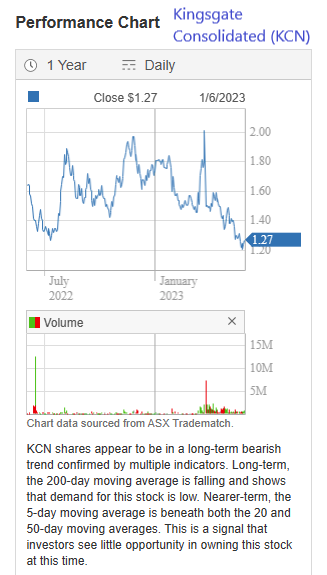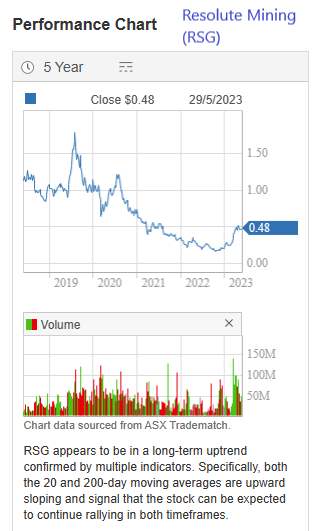01-June-2023: Significant-Gold-Exploration-Results-continue-near-Chatree.PDF
That's today's announcement from Kingsgate (KCN); they've been busy over the past couple of months; Here are their updates from just May alone, in chronological order:
10-May-2023: Chatree-Gold-Mine-Production-Update-10-May-2023.PDF
18-May-2023: Chatree-Refining-Update.PDF
24-May-2023: Chatree-Gold-Mine-Delivering-Good-Ounces.PDF
They certainly couldn't be accused of not keeping the market informed... Mind you, they've only just been able to restart their one and only production asset, the Chatree Gold Mine in Thailand, after years of zero production due to the Thai government making accusations against the company and virtually kicking them out of the country. There was talk of international arbitration, and court cases, and what-not, however at the end of the day it seems that Kingsgate made peace with the Thai government and they have now been allowed to restart Chatree and once again produce some gold and much-needed revenue.
I do NOT hold shares in this company - because they are an ASX-listed and Australian-HQ'd goldie with their gold assets in Thailand - but I have followed them over the years, if for no other reason than to reinforce to myself and remind myself that there are significant risks to gold mining in places where the Government of that country can move the goal posts, or the government itself can change, sometimes to a Government that has different views on the benefits of either nationalising the country's gold and other in-the-ground resources, or has a different view on how much benefit the country should derive from foreign-controlled companies mining in their country, vs. how much the foreign-controlled company should benefit.
ASX-listed uranium play Paladin (PDN) suffered a -20% share price fall on Tuesday this week when news emerged that Namibia were considering taking minority stakes in mining and petroleum producers to reap more value from its mineral wealth.
Namibia is one of the biggest uranium producers in the world. It is also a major diamond producer and has significant hard rock lithium deposits.
"We are making a case that local ownership must start with the state, which holds ownership of our natural resources," Minister of Mines and Energy Tom Alweendo told lawmakers at a parliamentary workshop on Monday.
"The proposed state ownership should take the form where the state owns a minimum equity percentage in all mining companies and petroleum production, for which it does not have to pay."
Source: Namibia targets stakes in resource companies, miners' shares fall | Reuters
Now that's not the same thing as nationalising their uranium and other mining interests. It doesn't go that far. However, Paladin, who have a mothballed uranium mine in Namibia that they would like to restart at some point (probably when the uranium price rises enough to make it clearly worthwhile) was down at much as -24% intraday on Tuesday after that news broke, and closed down -19.55% for the day. They've bounced back a bit since then, but it does highlight one of the risks of countries moving the goalposts.
What I have noticed with Kingsgate (KCN), who of course are a gold miner, not a uranium miner, is that their share price has a little spike on every positive announcement (sometimes quite a BIG spike), but sooner or later they resume their downtrend again, as shown below, on their 1-year SP graph:

Note that closing price for today (1/6/2023) isn't necessarily KCN's closing price today, because the market hasn't yet closed today.
So here they are, living up to the promise that they would restart Chatree and hopefully find more gold in the area (as today's announcement discusses), yet their share price has retraced back to where it was when they had zero production and were not allowed to operate in Thailand.
Many commentators will discuss how they can not understand why companies like this look so cheap based on forward projections of production and revenues - another example is West African Resources (WAF) - who have done everything right from a management perspective, yet because they operate in West Africa, they trade at a very significant discount to similar gold producers who operate in much safer geographical locations, like here in Australia. ...However the is clearly a risk discount being applied to valuations - and it should be - because there is significantly more risk when you are buying shares in a company that has ALL or even the majority of their assets in high-risk countries. The risks can be political (goalpost moving), weather-related, or even currency-related, particularly in countries with rampant inflation and questionable government economic policies. Some of those currency risk can be reduced of course, particularly if the gold is sold in US dollars and most of the input costs incurred in the production of that gold are also paid for in US or Australian dollars, however there will always be some costs - such as labour costs, royalties, taxes, etc., that will need to be paid in the local currency. But weather and political risks abound in many countries, and while those companies feel that they need to "go there", we, as investors, do not.
We don't need to. We may choose to. If a company does everything right, and nothing goes wrong, due to either skill, good luck, or (usually) a combination of both skill and good luck, then the results can eventually be VERY good, as we have seen with Perseus (PRU), who also operate in West Africa, but then, so do Resolute (RSG) whose 1 year chart makes them look like they're killing it (in a good way), but their 5-year chart tells a different story. The risk discount applied to RSG through 2018 to 2020 was not enough, as 2021 and 2022 proved.

That technical analysis is clearly based only on what their SP has done in CY 2023, because through to the end of CY 2022 they were certainly not in a "long-term uptrend confirmed by multiple indicators".
Anyway, for those with a high risk tolerance, there can be money made in these stocks, but I have found that there is more often money lost.





